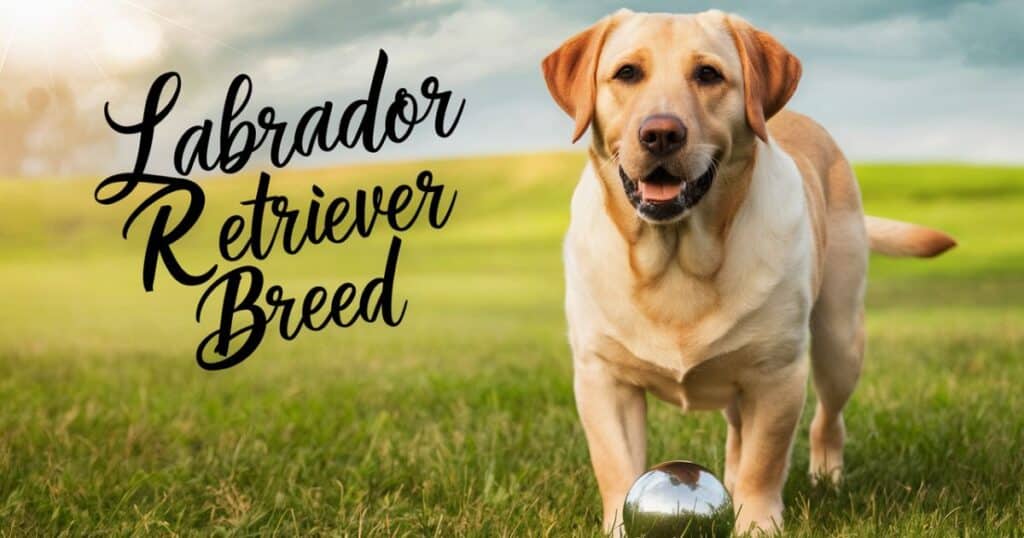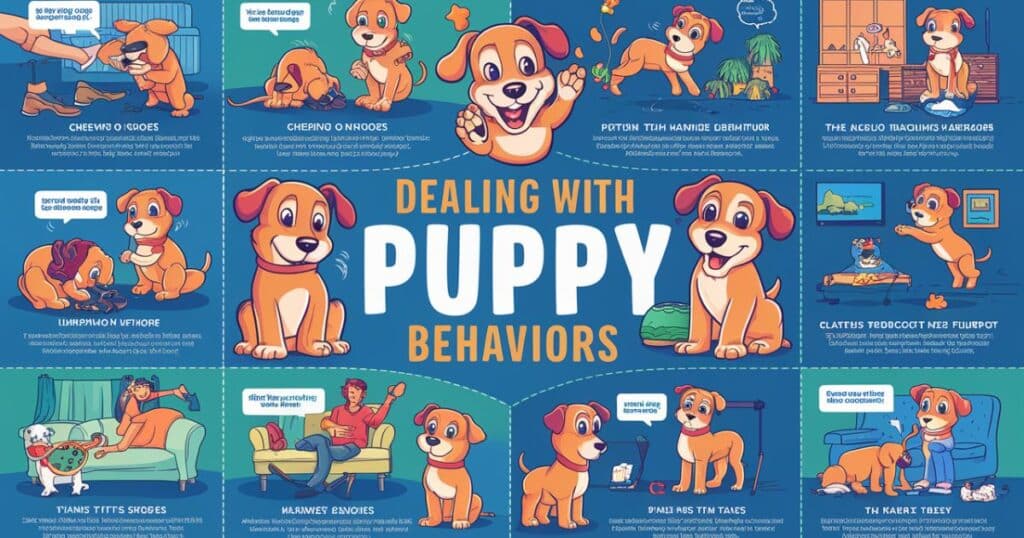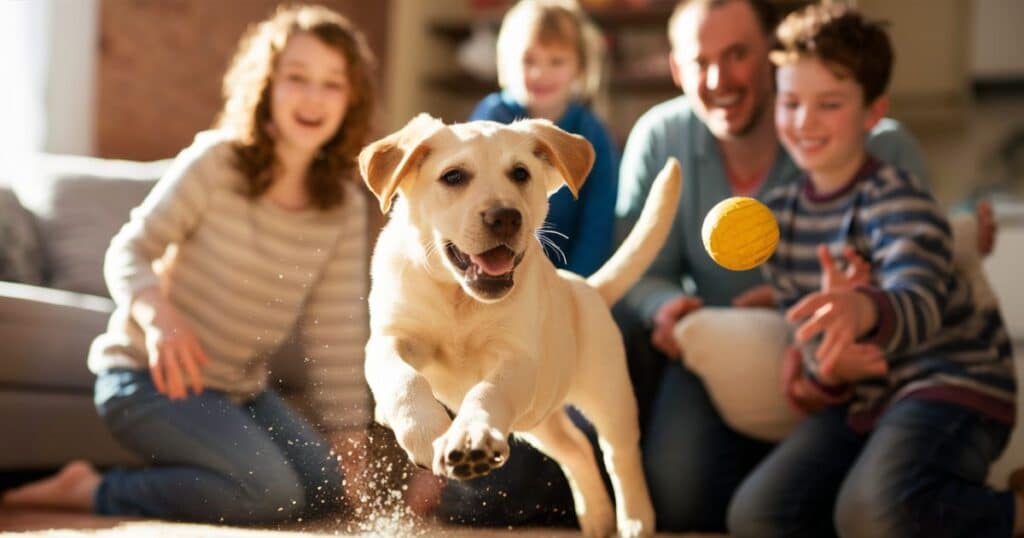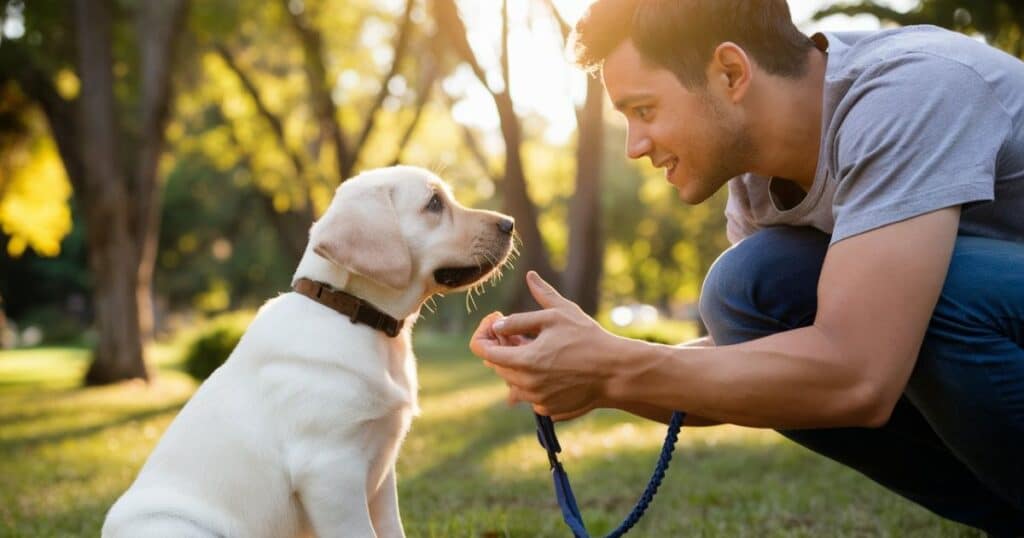Labrador Retriever puppies are among the most beloved and popular dog breeds worldwide, and it’s easy to see why. These friendly, intelligent, and energetic pups have an innate ability to bring joy and laughter into any household. With their endearing personalities and versatile nature, Labrador Retrievers have become beloved family companions. It is excelling in various roles from service dogs to therapy dogs, and even search-and-rescue operations. If you’re considering welcoming a Labrador Retriever puppy into your family, this comprehensive guide will provide you with all the essential information you need to ensure a smooth transition and a lifetime of happiness with your furry companion.
Understanding the Labrador Retriever Breed

Labrador Retrievers have a rich history that dates back to the 19th century in Newfoundland, Canada. Originally bred as hunting companions, these dogs quickly gained recognition for their eagerness to please, trainability, and unwavering loyalty. Their ancestors were highly prized for their ability to retrieve game from icy waters, thanks to their water-resistant coats and spider-like feet.
Over time, Labs have evolved into beloved family pets, captivating hearts with their gentle and affectionate nature. They have proven themselves as versatile companions, excelling in various roles such as service dogs, therapy dogs, and even search-and-rescue operations.
At their core, Labrador Retrievers are known for their friendly and outgoing personalities, making them excellent companions for families with children. They are intelligent and highly trainable, eager to learn and follow commands. Labs are also incredibly energetic, requiring regular exercise and playtime to maintain their physical and mental well-being.
Key Characteristics of Labrador Retrievers:
- Friendly and outgoing
- Intelligent and trainable
- Energetic and active
- Gentle and patient with children
- Loyal and eager to please
- Versatile and adaptable
Thanks to their adaptability and willingness to please, Labrador Retrievers have become a popular choice for families across the globe. Their easygoing nature and affectionate disposition make them a joy to have around, whether you’re an active outdoor enthusiast or a more laid-back homebody.
Preparing for a Labrador Retriever Puppy
Before welcoming a Labrador Retriever puppy into your home, there are several important considerations to keep in mind. These energetic and lively pups require a significant amount of time, space, and commitment from their owners. Proper preparation is key to ensuring a smooth transition and a successful integration into your family.
Choosing a Reputable Breeder or Adoption:
One of the most crucial decisions you’ll make is selecting a responsible Labrador Retriever breeder or considering adoption. Reputable breeders prioritize the health and well-being of their puppies, adhering to ethical breeding practices and providing comprehensive medical records and documentation.
When working with a breeder, ask about health clearances for the parents, such as hip and elbow evaluations, eye tests, and genetic screenings. A responsible breeder will also be transparent about their breeding program and provide guidance on puppy care and training.
Alternatively, adopting a Labrador Retriever puppy from a reputable shelter or rescue organization can be a rewarding experience, providing a loving home to a pup in need. Many shelters and rescues work closely with foster families to assess the puppies’ temperaments and provide valuable information to potential adopters.
Puppy-Proofing Your Home:
Labrador Retriever puppies are known for their curiosity and tendency to chew, so it’s essential to puppy-proof your home before their arrival. This includes:
- Removing or securing any potential hazards, such as electrical cords, toxic household plants, and small objects that could pose a choking risk.
- Creating a designated potty-training area and establishing a consistent routine.
- Investing in solid, chew-proof toys and providing ample entertainment to prevent destructive behavior.
- Securing trash cans, cabinets, and off-limit areas to discourage unwanted exploration.
It’s also a good idea to introduce your puppy to a comfortable and secure crate or playpen from the start. This will provide them with a safe space to retreat to and can aid in house training and preventing destructive behaviors when you’re unable to supervise them directly.
Essential Supplies:
To ensure a smooth transition and a comfortable environment for your new puppy, consider stocking up on the following essential supplies:
- High-quality puppy food and treats
- Stainless steel food and water bowls
- Comfortable and secure crate or playpen
- Durable chew toys and puzzle feeders
- Grooming supplies (brush, shampoo, nail clippers)
- Collar, leash, and ID tags
- Enzymatic cleaner for accidents during potty training
- Puppy pads or a litter box for indoor potty training
- Baby gates or exercise pens to restrict access to certain areas
By preparing your home and gathering the necessary supplies, you’ll be better equipped to provide a safe and nurturing environment for your Labrador Retriever puppy’s growth and development.
Caring for Your Labrador Retriever Puppy

Providing proper care and attention to your Labrador Retriever puppy is crucial for their physical and emotional well-being. From nutrition and exercise to socialization and grooming, these aspects will lay the foundation for a happy, healthy, and well-adjusted companion.
Feeding Guidelines for Labrador Retriever puppy
Proper nutrition is essential for your puppy’s growth and development. Consult with your veterinarian or a reputable Labrador Retriever breeder to determine the appropriate puppy food and portion sizes based on your pup’s age and weight.
Establish a consistent feeding schedule, typically consisting of three to four meals per day for puppies under six months old, gradually transitioning to two meals per day as they mature. Always provide fresh, clean water and avoid leaving food out for extended periods to prevent overeating or attracting pests.
Exercise and Mental Stimulation:
Labrador Retrievers are highly energetic dogs that require regular exercise and mental stimulation to prevent destructive behaviors and maintain their overall health. Engage your puppy in daily playtime, walks, and interactive games that challenge their minds and burn off excess energy.
As your pup grows older, gradually increase the duration and intensity of their exercise routines. Consider activities such as hiking, swimming (Labs are natural water dogs), and agility courses to keep them physically and mentally engaged.
Socialization and Training:
Early socialization and positive reinforcement training are crucial for your Labrador Retriever puppy’s development. Expose them to various sights, sounds, and experiences in a controlled and safe environment to help them become well-adjusted and confident dogs.
Enroll in puppy socialization classes or training programs to teach basic obedience commands and reinforce desired behaviors. Consistency and patience are key during this process. Positive reinforcement techniques, such as rewarding with treats and praise, are highly effective for Labrador Retrievers, who are eager to please and respond well to encouragement.
Grooming and Veterinary Care:
Labrador Retrievers have a short, dense coat that requires regular brushing to minimize shedding and maintain a healthy skin and coat. Establish a grooming routine that includes brushing, nail trimming, ear cleaning, and bathing as needed.
Don’t forget to schedule regular veterinary check-ups and follow your veterinarian’s recommendations for vaccinations, deworming, and preventative care. Microchipping your puppy is also recommended for identification purposes in case they ever get lost or separated from you.
The First Few Weeks with Labrador Retriever puppy

The first few weeks with your Labrador Retriever puppy can be both exciting and challenging. This is a crucial period for bonding, establishing routines, and setting the stage for a well-behaved and well-adjusted companion.
Here’s what to expect and how to navigate this important time:
What to Expect:
- Frequent potty breaks and accidents as your puppy learns to housetrain
- Excessive chewing and exploring as they navigate their new environment
- Potential separation anxiety when left alone
- Teething and biting as their adult teeth start to come in
- Lots of energy and a need for frequent nap times
Establishing Routines and House Rules:
Consistency is key when training your Labrador Retriever puppy. Establish a predictable routine for feeding, potty breaks, playtime, and crate training. Set clear boundaries and reinforce positive behaviors with rewards and praise.
During this initial period, it’s important to be patient and understanding. Your puppy is adjusting to a new environment and learning the rules of your household. Consistency in training and reinforcement will help them understand what is expected of them.
Dealing with Puppy Behaviors:

Puppy biting and chewing are natural behaviors, but it’s important to redirect these tendencies appropriately. Provide plenty of chew toys and engage in interactive play sessions to burn off excess energy. Never punish your puppy for these behaviors; instead, redirect them to appropriate outlets and reward good behavior.
Separation anxiety can also be a challenge during the initial adjustment period. Gradually increase the time your puppy is left alone, and consider using a crate or puppy-proofed room to prevent destructive behaviors when you’re away. Providing them with puzzle toys or treat-dispensing toys can also help alleviate boredom and anxiety.
The Importance of Patience and Consistency:
The first few weeks with your Labrador Retriever puppy will require a great deal of patience and consistency from you and your family. Potty training, crate training, and establishing boundaries can be frustrating at times, but it’s essential to remain calm and positive throughout the process.
Consistency in your approach is crucial, as puppies thrive on routine and structure. Ensure that all family members are on the same page regarding rules, commands, and training techniques to avoid confusing your pup.
Remember, every puppy is an individual, and some may progress more quickly than others. Celebrate small victories and remain patient; with time and positive reinforcement, your Labrador Retriever puppy will learn and grow into a well-behaved companion.
ALSO READ: THE CHARMING MINI GOLDENDOODLE 2ND GEN: A COMPACT COMPANION
Fun with Your Labrador Retriever puppy

While Labrador Retrievers require a significant amount of care and attention, they also make for incredibly fun and rewarding companions. Their playful and affectionate nature makes them ideal companions for families looking to incorporate more joy and laughter into their daily lives.
Activities and Games:
Labrador Retrievers thrive on physical and mental stimulation. Engage your pup in interactive games such as fetch, swimming (Labs are natural water dogs), and agility courses. These activities not only provide exercise but also strengthen the bond between you and your dog.
As your Lab grows older, consider enrolling them in obedience classes, dog sports like flyball or dock diving, or even therapy dog training. These activities will challenge their minds and bodies while providing opportunities for socialization and bonding.
Puppy Socialization Classes and Playdates:
Socialization is crucial for your Labrador Retriever puppy’s development. Enroll them in puppy socialization classes, where they can interact with other dogs and people in a controlled environment. These classes teach valuable skills such as bite inhibition, proper greeting manners, and how to navigate various situations calmly.
Additionally, arrange playdates with well-socialized, vaccinated dogs to help your pup develop appropriate social skills. Positive interactions with other dogs and people from an early age will help shape a well-rounded and confident Labrador Retriever.
Family Outings:
Labrador Retrievers are highly adaptable and love being included in family activities. Whether it’s a hike in the park, a trip to the beach, or a picnic in the backyard, your furry companion will relish the opportunity to explore new sights and smells with their beloved family.
As your Lab matures, consider bringing them along on family vacations, camping trips, or even dog-friendly restaurants and cafes. Their friendly and easygoing nature makes them excellent travel companions, provided you plan and prepare accordingly.
Bonding Through Training:

Training your Labrador Retriever is not only essential for their obedience and manners but also an excellent opportunity to strengthen your bond. Positive reinforcement training methods, such as clicker training or reward-based training, can be incredibly effective and enjoyable for both you and your pup.
Incorporate training sessions into your daily routine, making them a fun and rewarding experience. Celebrate your Lab’s progress and successes, and remember to keep sessions short and engaging to maintain their attention and enthusiasm.
Remember, every puppy is an individual, and their needs may vary. Consult with your veterinarian, reputable breeders, or experienced Labrador Retriever owners for personalized advice and guidance.
| Other Retriever Breeds |
| Golden Retriever puppies: known for their gentle nature and adaptability, making excellent family companions. |
| Virginia Bay Retriever puppies: Strong and energetic, these pups excel in hunting and water-related activities. |
| Flat-Coated Retriever puppies: Intelligent and eager to please, with a distinctive sleek coat. |
While Labrador Retrievers are among the most popular retriever breeds, other varieties like Golden Retrievers, Chesapeake Bay Retrievers, and Flat-Coated Retrievers offer their unique characteristics and strengths. Regardless of the breed, proper research, preparation, and commitment are essential for providing a loving and nurturing home for any puppy.
ALSO READ: THE ULTIMATE GUIDE TO TEDDY BEAR GOLDENDOODLE PUPPIES
Conclusion:
In conclusion, Welcoming a Labrador Retriever puppy into your life is a rewarding and life-changing experience. These lovable and energetic companions will bring endless joy, laughter, and unconditional love into your home. By providing proper care, training, and socialization, you’ll lay the foundation for a strong and lasting bond with your furry friend.
Remember, finding puppies from reputable sources is crucial to ensuring a healthy and well-adjusted Labrador Retriever. Whether you choose to work with a responsible Labrador Retriever breeder or opt for adoption, your commitment to your pup’s well-being will be rewarded tenfold with their unwavering loyalty and affection.
Embrace the joys and challenges of puppy parenthood, and cherish every moment with your Labrador Retriever. With patience, consistency, and a whole lot of love, you’ll embark on an incredible journey filled with unconditional companionship and lasting memories.

Davin Connor is an experienced author with 3 years in pets writing. Known for concise, informative content, he shares expertise on pet care, behavior, and health through his engaging articles.






